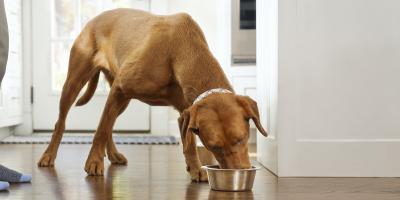Why Do Dogs Chew Everything?


When it comes to dogs’ favorite pastimes, chewing is at the top of the list. For them, chewing is a natural, instinctive behavior that they enjoy. Sometimes, though, chewing can be an indication of another issue, and it’s good to understand the difference between normal, healthy chewing and problematic chewing.
If it’s a chew toy or a dental treat, chewing is healthy and can help keep their teeth clean. If it’s your favorite pair of shoes, books or furniture, it’s a problem. Excessive or inappropriate chewing can have many potential causes, such as separation anxiety or boredom.
Here are a few reasons why your dog might be chewing on everything and some tips on what you can do to curb that behavior when it starts to become a problem.
Reasons Your Dog Chews Everything
Teething
Chewing comes naturally to puppies because they explore the world around them with their noses and their mouths. Then, of course, there’s the teething process. Puppies relieve the discomfort caused by their new teeth growing in by chewing. Being puppies, they probably won’t have a firm grasp on what they should and should not chew just yet.
This requires puppy-proofing your home to protect them from chewing on anything that could be hazardous to them if ingested. Be sure to move or remove the following to an area where your puppy can’t reach them:
- Electrical cords
- Medications
- Cleaning supplies
- Plants
- Shoes
- Clothing
- Trash cans
- Choking hazards like Legos, beads, etc.
It’s a good idea to put up puppy gates to prevent them from wandering out of sight where they can get into chewing-related mischief.
Fortunately, you can train a puppy not to chew up all of your belongings and furniture, and the sooner you start, the better. When you catch them chewing on something they shouldn’t, give them a firm “No!” and then redirect them toward a chew toy. Be sure to praise them for chewing on the toy. Soon they’ll develop a natural urge to chew on their toys rather than something they shouldn’t.
Stress & Separation Anxiety
Like humans, dogs can develop some bad coping skills, and sometimes it takes the form of chewing. Some dogs will develop separation anxiety.
To cope with the stress, they may engage in habits that can involve excessive chewing and can do quite a bit of damage to the house if left to their own devices. Fortunately, there are ways to curb separation anxiety and even prevent it from happening in the first place.
Boredom
When dogs get bored, they need an outlet just like people do. For us, it’s something like flipping on the TV, going for a jog or maybe texting a friend.
For dogs, chewing (and sometimes digging) can be a tempting solution. Making sure they have access to plenty of chew toys can help, but the bigger problem that needs solving is keeping dogs engaged and stimulated.
Habit
Unfortunately, owners who don’t get a handle on their dog’s negative chewing behaviors in the first one to two years are likely to end up with a dog who engages in long-term destructive chewing. This is not to say you can’t correct bad behavior in older dogs but teaching them what they should and should not chew on at a younger age is easier and can save you a lot of hassle.
How to Stop Your Dog From Excessive Chewing
While dogs are natural chewers, making sure they are chewing on appropriate things, like chew toys, is essential. Fortunately, there are some good ways to help your dog kick the habit or prevent it before it starts.
Training
An excellent technique to teach your dog to stop chewing on something is by teaching them how to trade. Next time they have a chew toy, say “Trade!” in an excited voice and offer them a treat.
Once they drop the toy, give them the treat, then hand them back their toy. This teaches dogs that if they “trade,” they not only get a treat, but they get their toy back as well. This will make them far more likely to give you a forbidden item.
Keep Your Dog Stimulated
Since boredom can be the root cause of excessive chewing, keeping your dog engaged is essential. Dogs need mental and physical stimulation to keep them healthy and prevent them from developing destructive coping skills.
To combat this, try to schedule a time at least once a day where you and your dog do fun activities together. Whether it’s throwing a ball in the yard, taking a long walk or engaging in a dog enrichment activity, it's good for them. It also might be all you need to keep them from chewing up your favorite shoes.
Help Ease Separation Anxiety for Your Dog
If the chewing behavior happens while you’re away, this is likely caused by separation anxiety. This can accompany other symptoms such as excessive barking or howling and urination or defecation inside the house.
You can prepare your dog for any schedule changes that will keep you away from home for longer than usual by:
Starting a Consistent Routine: Try to set up a schedule where your dog can rely on getting up, walking, eating and playtime at specific times during the day, so your dog gets used to a routine.
Try Separation at Home: Give your dog some alone time by having them spend time in their crate or closing doors and letting them be by themselves in a quiet part of the house.
Plan Short Trips Away From Home: Try to plan short periods away from home where you run errands, meet for lunch or do anything that will keep you away from your dog for a little bit to get them used to having some alone time.
Relax With Your Dog Before Leaving:
- Sit with your dog for about 10 to 20 minutes before you leave
- Pet them, give them lots of praise and then calmly leave the house
- If you must leave abruptly, give your dog a treat before you go to add a positive association to your departure
Discover more tips and advice for dog owners from our experts on our Pet Expertise page.
Related articles

Reward Yourself with myPurina
Earn and redeem rewards for Purina products with the myPurina app.






